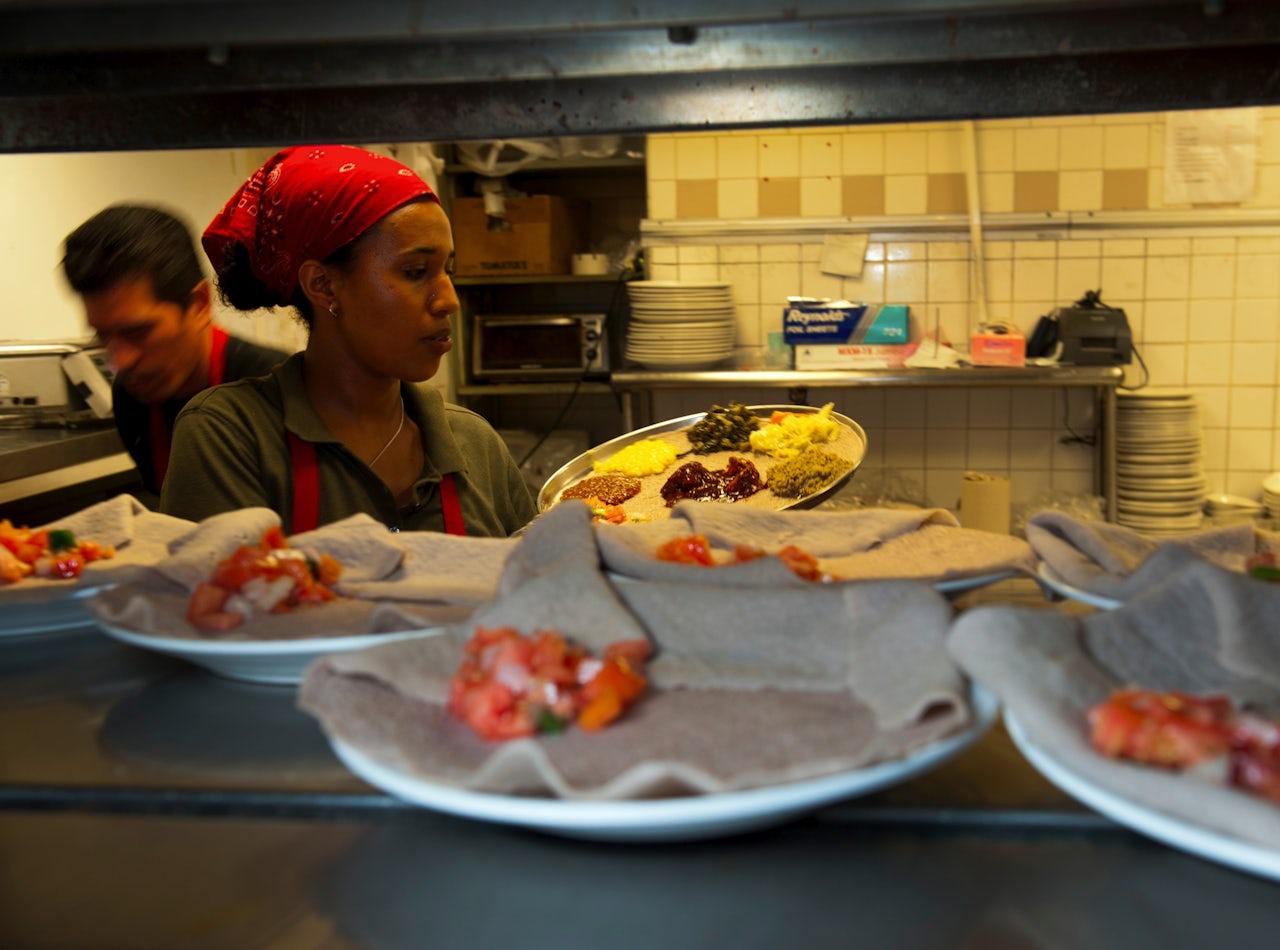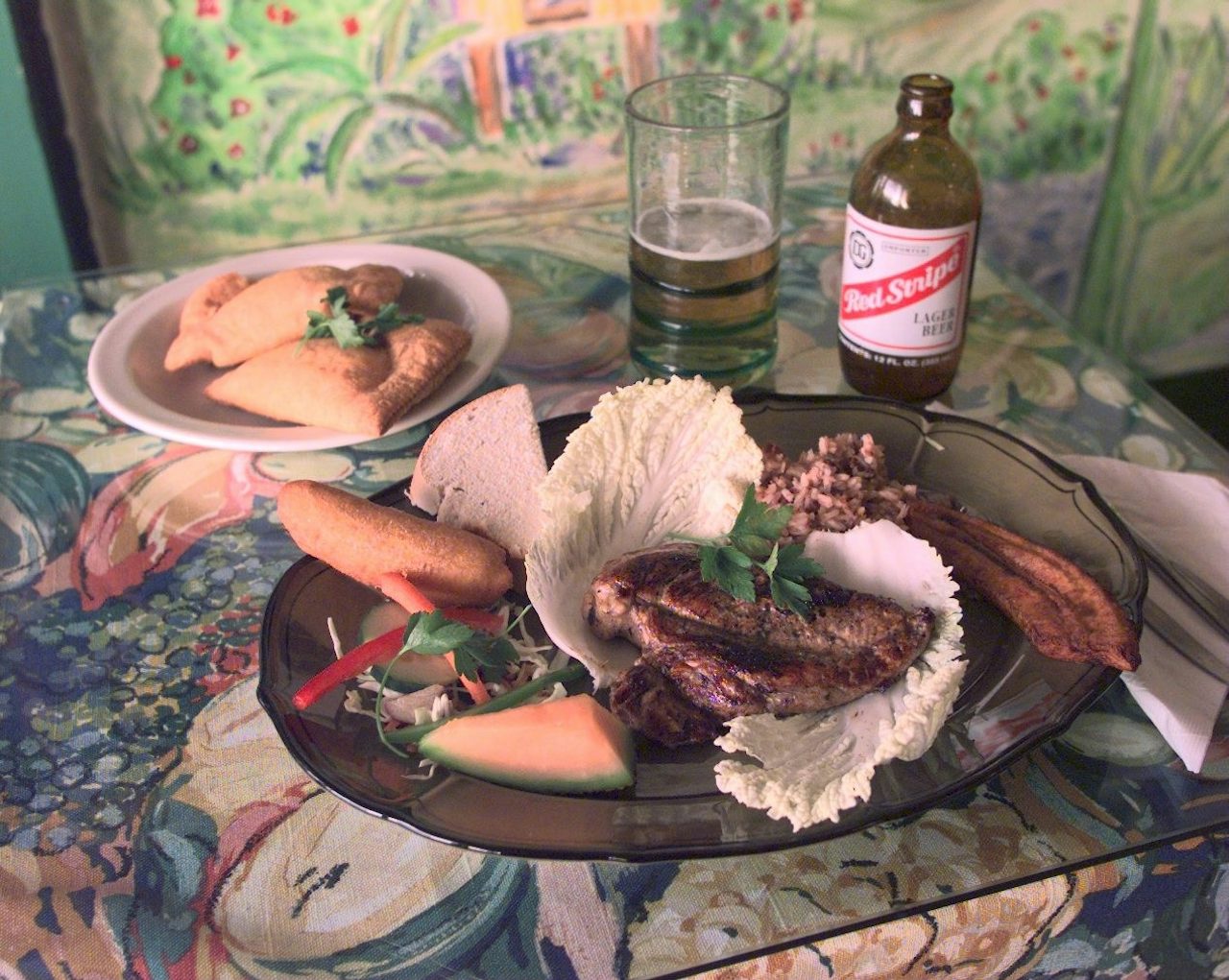Like other cities seeing an influx of residents and, along with them, rising rents, Portland, Oregon is a place that has many food and restaurant festivals. This year alone it will have hosted the Portland Beer and Cheese Fest, the Oregon Fermentation Festival, Portland Burger Week, Portland Pizza Week, the Northwest Food and Wine Festival, VegFest, Feast Portland, The Bite of Oregon, Portland Dining Month, the Portland Seafood & Wine Festival, Chef’s Week PDX, and the Portland Bourbon and Bacon Fest, to name a few. And what so many of these festivals have in common, aside from their focus on food, is that without an intentional effort to reach out to communities of color, they often end up being overwhelmingly white-run and -centered affairs.
So when I got an invitation to observe the city’s first “Support Black-Owned Restaurant Days” two years ago, I was excited. It seemed like a way for residents of the city that is contending with its past and present of displacing residents of color to mitigate a tiny bit of that harm and show support for local black restaurateurs. And amid the plethora of restaurant weeks and food festivals for any and every palette, black restaurant weeks, which have taken place all over the country, are created with civil rights in mind. They offer a type of consumer resistance that goes deeper than selling products like soaps and T-shirts to focus on investing in not only black businesses, but visible ones at that, owned by neighbors and friends.
The annual Support Black-Owned Restaurant Week in Portland is just around the corner! Details on the eats: https://t.co/4yMs7Z9DoA#PDXpic.twitter.com/U27G7Pnr1Y
— Travel Portland (@travelportland) August 11, 2017
Support Black Owned Restaurants Days was inspired by a similar event in the Bay Area. In 2014, National Black Business Month creators John William Templeton and Frederick E. Jordan Sr. ended the annual, August-long celebration of black businesses with Hands Up|Shop Black Week, inspired by protests in Ferguson following the police killing of Michael Brown. That week and the month were topped off with Black Restaurant Day, on which consumers were encouraged to patronize one of the nation’s many black-owned restaurants in support of their local black communities. The San Francisco Chronicle published a list of black-owned restaurants in the Bay area to promote the celebration.
Portlanders continue to observe what is now called Support Black Owned Restaurants Week every August, and each year residents of more and more cities are dedicating week or weekend to local, black-owned restaurants. In 2016, black restaurant weeks popped up in Madison, Memphis, Houston, Washington state, Chicago, and Milwaukee. By the end of this year, at least 15 city and region-wide black restaurant weeks and days will have been observed across the country.
Event planner and community advocate Cynthia Daniels organized Black Restaurant Week in Memphis in 2016. Originally from Atlanta, she saw an opportunity to use her professional skills to support black-owned restaurants in food-destination city. Through the event, Daniels says the eight participating businesses were able to bring in $80,000 in profit. The event’s second year was even more successful, with 14 participating restaurants. Additionally, the increase in business gave some restaurants the opportunity to temporarily recruit and then permanently hire on additional staff and reinvest profits back into their businesses. “One [restaurant owner] invested in a catering van. Now she has the additional capital to expand her business,” said Daniels. “So hearing those types of stories were really truly amazing to be able to help their businesses grow.”
Daniels said she had never heard of other black restaurant weeks before she created her own, but she applauded the spreading movement to support black businesses. Templeton, on the other hand, believes annual celebrations of National Black Business Month, now in its 14th year, are to thank for increased focus on black-owned restaurants and other businesses. Speaking to The Outline via phone, he stressed the importance of situating the rise of black restaurant weeks in the larger, older nationwide movement to promote and celebrate black-owned businesses and black entrepreneurs in the U.S.
The most effective civil rights strategy has always been the dollar.
According to Templeton, the real pioneer of festivals celebrating black food in particular was George W. Davis, who started the Black Cuisine Festival in San Francisco in 1979. Davis, who died in 2010, founded the Bayview-Hunters Point Multipurpose Senior Center and started the festival as a way of showing off the culinary talents of the center’s clients and sharing black food heritage with younger generations. “So that's sort of the seed that got planted three decades ago,” said Templeton. “Now other people are saying, Oh I need to recognize black food in my city and that sort of thing. But he is the person that started that you know, because he saw that food was the connecting link for the community.”
Newer black restaurant weeks build on the influence of longer-running, more localized black food festivals, responding to a cultural moment in which gentrifying cities are holding more lucrative food festivals and black entrepreneurs are persevering despite receiving fewer U.S. Small Business Administration loans and relying more heavily on personal finances. According to the Census Bureau’s 2012 Survey of Business Owners, there are about 2.6 million black-owned businesses in the U.S., a 34 percent increase from 2007. But the number of black-owned eating and drinking businesses grew even more sharply, by 49 percent in those years alone, compared to other types of black-owned businesses. Nevertheless, black-owned restaurants remain underrepresented in local foodie scenes. If all of the current city- and region-wide black restaurant weeks, as well as those centered on immigrant communities of color, continue and thrive, they could help, in a small but meaningful way, address those discrepancies and shortcomings in the cities they serve. “The most effective civil rights strategy has always been the dollar,” said Templeton. “Black restaurants and other black businesses are a mechanism to aggregate consumer spending. And so every effort that encourages people to visit them is useful.”
Lack of access to capital, and by extension marketing dollars, are very real obstacles black restaurant owners face. While black neighborhood restaurants used to thrive on organic foot traffic in their communities, gentrification and other types of forced displacement have broken apart such neighborhoods. As such, another reason black restaurant weeks are having a moment right now may be that they employ a collective effort to leverage visibility for existing black-owned businesses while at the same time highlighting them as new centers for community. “The restaurants actually fulfill the function that the churches used to do,” said Templeton. And both he and Daniels mentioned that it’s not only black folks flocking to black restaurants during these promotional events. “The first year we did [Memphis Black Restaurant Week] it was the most diverse clientele my restaurant owners had ever seen,” said Daniels. “They saw Caucasian, Hispanic, and Asian customers, and they have been able to keep a lot of them and that's something they'd never seen before.”
Templeton emphasized his reluctance to focus on black restaurant weeks in particular, fearing consumers could then have license to somehow write off black-owned restaurants as novelties and the weeks as fads. “Black businesses don't get covered in business news. But in San Francisco [the media has] been conditioned to know there's a lot of black restaurants [and] a lot of different kinds of black restaurants,” he said. “So that's kind of where we're trying to get to, where the black restaurant week is where you sum up things that you've been writing about all year.” Business and food writing critiques aside, black restaurant weeks are exercises in local black community visibility in cities drowning in white-centered foodie scenes. And at a time when Americans want their spending to match their values, black restaurant weeks offer the convenience of consumerist “resistance” with resistance of direct action. Beyond that they involve good food. You’d have to be racist not to like them.




